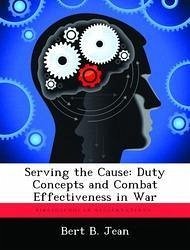This thesis examines the relationship between duty and combat effectiveness in the Luftwaffe and the USAAF during World War II. The author argues that duty is a fundamental characteristic of a military institution. Commanders must develop and maintain devotion to duty in order to ensure combat effectiveness. To evaluate the validity of this argument, the author researched leading historical literature regarding the role duty played in the two air forces and also examined primary evidence such as unit histories, letters, personal diaries, and interrogation reports. The Luftwaffe, during the heady years of victory, reaped the benefits of a strong sense of duty; and success strengthened the duty concept. Thus, the duty concept, combat effectiveness, and military effectiveness were mutually reinforcing. The Luftwaffe then went through a period of uncertainty and ultimately defeat. During these periods, combat effectiveness was degraded due to strategic misjudgments; the duty concept seemed to stay strong, but there were indications that it wore down at the margins. Ultimately, due to persistent strategic failure and combat ineffectiveness, devotion to duty was ultimately undermined and the Luftwaffe leadership openly plotted against Reichsmarschall Hermann G ring.








